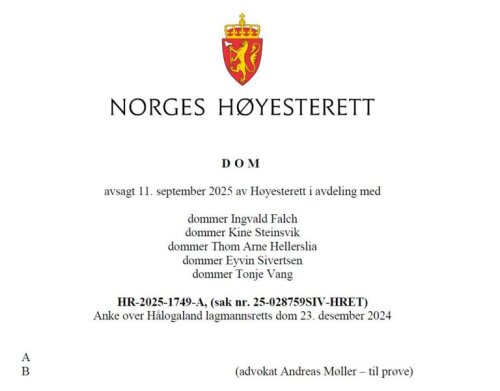Best Landlord & Tenant Lawyers in Lillestrøm
Share your needs with us, get contacted by law firms.
Free. Takes 2 min.
Free Guide to Hiring a Real Estate Lawyer
List of the best lawyers in Lillestrøm, Norway
About Landlord & Tenant Law in Lillestrøm, Norway
Landlord and tenant law in Lillestrøm, Norway, is primarily governed by the Norwegian Tenancy Act (Husleieloven). The law sets out the rights and obligations of both landlords and tenants for all types of residential and some commercial property rentals. Whether you are renting out your property or looking for a place to live, it is essential to understand your legal standing to ensure a fair tenancy. The municipality of Lillestrøm follows national laws but may have local regulations and rental market conditions to consider.
Why You May Need a Lawyer
Navigating landlord and tenant issues can become complex, and legal assistance may be required in several situations. Common scenarios where residents and property owners in Lillestrøm might seek help from a lawyer include:
- Disputes over tenancy agreements, such as rent, deposits, or lease termination
- Eviction processes and the rights of both parties
- Claims for property damages or maintenance responsibilities
- Disagreements regarding subletting or lease transfers
- Allegations of illegal or unfair contract terms
- Issues related to return or withholding of security deposits
- Tenant’s right of succession to the lease
- Handling rent adjustments or increases
- Protection from harassment or unlawful interference with tenancy
In these cases, legal counsel can help you understand the law, negotiate on your behalf, or represent you before authorities or in court.
Local Laws Overview
In Lillestrøm, landlord and tenant relationships are subject to the national Norwegian Tenancy Act. Here are some key aspects relevant to those living or owning property in the area:
- Tenancy Agreements: Written contracts are standard, detailing rent, terms, and responsibilities. Oral agreements are possible but can lead to disputes.
- Security Deposit: Landlords may request a deposit up to six months’ rent, held in a separate account.
- Rent Controls: Rent must be fair and not exceed market value. Rent increases can only occur under specific legal conditions and advance notice is required.
- Termination: Both parties have the right to terminate the lease but must follow notice periods and justification requirements. Unjustified termination can be challenged.
- Eviction: Eviction cannot occur without a court order. Tenants have the right to defend themselves and may resist eviction on specific legal grounds.
- Maintenance: Landlords are responsible for significant repairs and maintenance while tenants must keep the property tidy and report damages promptly.
- Subletting: Tenants need the landlord’s permission to sublet, and refusal must have a valid reason.
Given these rules, both landlords and tenants in Lillestrøm should familiarize themselves with their rights and obligations before entering into rental agreements.
Frequently Asked Questions
Is a written lease mandatory in Lillestrøm?
While not strictly required by law, a written lease is highly recommended to avoid misunderstandings and provide clear evidence in case of disputes.
Can a landlord increase the rent whenever they want?
No, landlords must provide three months written notice before raising the rent, and increases must be in line with local market rates.
How much can a landlord ask for as a deposit?
The maximum deposit is six months’ rent, and it must be kept in a separate, interest-bearing account in the tenant’s name.
What should I do if my landlord does not return my deposit?
You should first try to resolve the issue directly. If that fails, you can pursue your claim through the Conciliation Board (Forliksrådet) or the ordinary courts.
Can a tenant be evicted without a court order?
No, eviction without a court order is illegal. The landlord must follow the proper legal process, and the tenant has the right to contest the eviction.
What maintenance is the tenant responsible for?
Tenants are generally responsible for minor maintenance and everyday cleaning. Major repairs and maintenance are the landlord’s responsibility.
Is subletting allowed in Lillestrøm?
Subletting is allowed with the landlord’s consent. The landlord can only refuse for valid reasons.
What is the notice period for ending a tenancy?
The standard notice period is three months for both landlords and tenants unless otherwise stated in the contract.
Can tenants challenge unfair contract terms?
Yes, tenants can challenge any contract terms that violate the Norwegian Tenancy Act or other consumer protection regulations.
Where can tenants get help if there is a dispute?
Tenants can seek advice from the local municipality’s legal aid services, the Norwegian Consumer Council, or consult with a lawyer specializing in tenancy law.
Additional Resources
Several organizations and governmental bodies provide support and information about landlord and tenant rights in Lillestrøm:
- Lillestrøm Municipality Housing Office - Assists with housing questions and municipal rental properties
- Norwegian Consumer Council - Offers guidance on tenant rights and dispute resolution
- Conciliation Board (Forliksrådet) - Handles minor civil disputes, including landlord-tenant issues
- Legal Aid Clinics - Provide free or low-cost legal advice for those who qualify
- Professional law firms in the Lillestrøm area - Specialize in real estate and tenancy matters
Next Steps
If you find yourself needing legal advice for a landlord and tenant issue in Lillestrøm, consider taking the following steps:
- Gather all relevant documents, including your lease contract, correspondence, and payment records
- Try to resolve the conflict directly with the other party, if possible
- Contact local resources or legal aid services for initial guidance
- Consult with a specialized lawyer for a full assessment of your case
- If negotiations fail, be prepared to pursue your claim through formal dispute resolution or the courts
Remember that early intervention and understanding your rights can often prevent disputes from escalating. Seeking qualified legal advice ensures that your interests are protected throughout the process.
Lawzana helps you find the best lawyers and law firms in Lillestrøm through a curated and pre-screened list of qualified legal professionals. Our platform offers rankings and detailed profiles of attorneys and law firms, allowing you to compare based on practice areas, including Landlord & Tenant, experience, and client feedback.
Each profile includes a description of the firm's areas of practice, client reviews, team members and partners, year of establishment, spoken languages, office locations, contact information, social media presence, and any published articles or resources. Most firms on our platform speak English and are experienced in both local and international legal matters.
Get a quote from top-rated law firms in Lillestrøm, Norway — quickly, securely, and without unnecessary hassle.
Disclaimer:
The information provided on this page is for general informational purposes only and does not constitute legal advice. While we strive to ensure the accuracy and relevance of the content, legal information may change over time, and interpretations of the law can vary. You should always consult with a qualified legal professional for advice specific to your situation.
We disclaim all liability for actions taken or not taken based on the content of this page. If you believe any information is incorrect or outdated, please contact us, and we will review and update it where appropriate.











